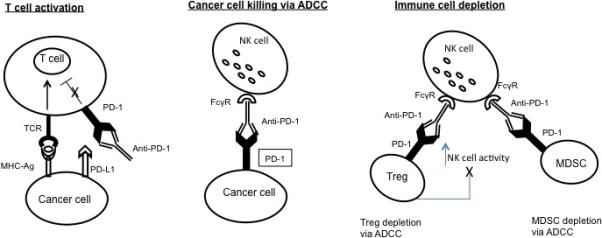Figure 2.

A diagram demonstrating blocking by anti-PD-1 Ab of PD-1 receptor-PD-L1 interactions. In the presence of a PD-L1+ tumor, checkpoint blockade with anti-PD-1 Ab not only unleashes immune cell effector functions from inhibition but provides a mechanism for tumor cell destruction by ADCC. In the presence of anti-PD-1 Ab, which targets all PD-1+ cells (i.e., immune cells, including Treg and MDSC, tumor cells), activated FcgR+ NK cells and monocytes effectively mediate ADCC. Tumorassociated antigens released by dying tumor cells are presented to activated, unleashed T effector cells and, in the absence of Treg, which are partially or completely depleted by ADCC, and which are no longer expanded or stabilized by PD-L1 signaling, swift anti-tumor immune responses are generated. The illustrated ADCC mechanisms will be effective only if mediated by the Ab with IgG1 or IgG3 isotypes.
ADCC: Antibody-dependent cytotoxicity; MDSC: Myeloid-derived suppressor cell; NK: Natural killer; PD-1: Programmed death-1; PDL-1: Programmed death ligand-1; TCR: T-cell receptor.
